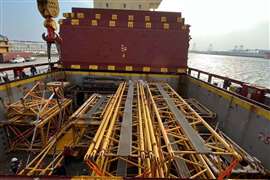Navigating new immigration policies in the construction industry
16 January 2025
Joel Dandrea discusses what construction contractors need to know.
 Photo: Chris Linnett
Photo: Chris Linnett
With the start of a new year, and a new administration preparing to take office, the construction industry is bracing for potential changes in immigration enforcement. President-elect Donald Trump’s pledge to ramp up deportations has left many contractors wondering how these shifts could affect their workforce and operations. While details remain unclear, experts stress the importance of preparation.
To that end, planning for possible policy changes starts with ensuring compliance. Employers are encouraged to conduct internal audits of their I-9 forms, which verify employee eligibility to work in the U.S. This proactive measure helps identify and address discrepancies before they become larger issues.
The process is straightforward: Collect all existing I-9 forms; ensure every employee has a completed form on file; correct minor errors or, for major issues, issue new forms; and review I-9s for terminated employees to ensure compliance with record-keeping laws.
While necessary, these audits require careful handling, however, as repeated checks can disrupt workers and, in some cases, lead to unintended terminations, even among those with valid work authorization. Employers should also approach reverification cautiously, as doing so without clear justification could risk being seen as discriminatory.
Key actions
Increased workplace enforcement is another potential concern. Past administrations have targeted industries like manufacturing and food processing. While it’s unclear if construction will be a focus this time, contractors are advised to prepare for visits – both announced and unannounced – by Immigration and Customs Enforcement (ICE) or Homeland Security Investigations (HSI).
According to the National Immigration Law Center, ICE agents may come to a workplace as part of an investigation into an employer – to review records for worker authorization. In those cases, contractors get a three-day heads-up. In a jobsite raid, however, federal agents from ICE or HSI would show up unannounced. That said, immigration agents can only enter a private property such as a jobsite if they have a judicial warrant signed by a judge.
Key actions you can take during a raid include: Verifying that agents have a judicially signed warrant; ensuring the warrant specifies the company’s legal name and address; and consulting legal counsel immediately – even as the raid unfolds.
Bear in mind, employers should also avoid actions that could violate worker rights or lead to legal trouble, such as sorting employees by immigration status or helping unauthorized workers evade enforcement.
As for how you navigate such disruptions, a well-crafted “Rapid Raid Response Plan” can help contractors respond effectively to all manner of workplace investigations. This includes training key staff on legal compliance and best practices during an ICE visit. For instance, video documentation of raids may protect employers and workers in potential legal proceedings.
Additionally, consider the broader impact of heightened scrutiny. Fear in the workplace discourages employees from reporting safety hazards or voicing concerns. This reluctance can compromise not just individual workers but entire teams, making it critical for contractors to foster a supportive environment. Effective communication should be part of your due-diligence effort.
Building the foundation
It goes without saying, for an industry already grappling with labor shortages and rising costs, such immigration challenges could add another layer of complexity. But as history shows, the construction sector has a knack for resilience and adaptation. By taking proactive steps – auditing records, preparing for enforcement actions and supporting workers – contractors can navigate these uncertain times while maintaining a strong and compliant workforce.
In the end, it’s not just about adhering to policies; it’s about protecting the integrity of an industry that builds the backbone of our economy. As one industry leader recently put it: “Preparation today is the foundation for a stronger tomorrow.”




